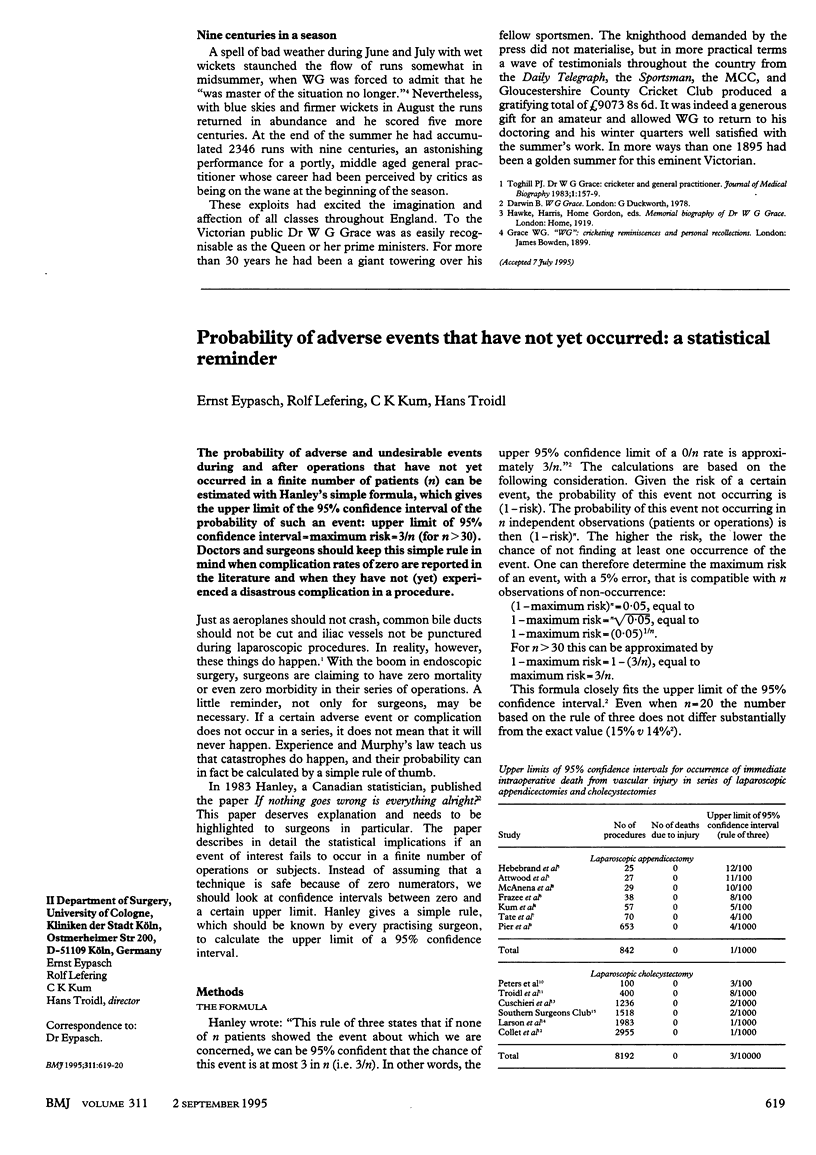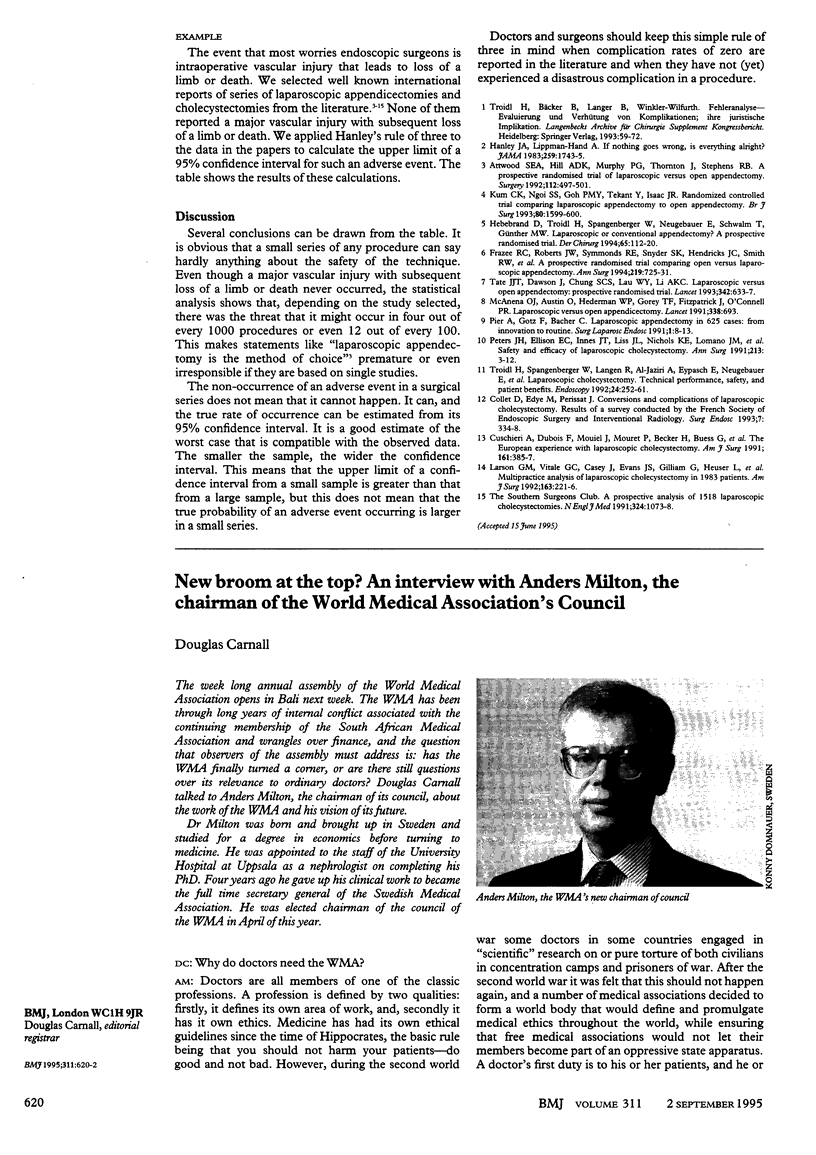Abstract
The probability of adverse and undesirable events during and after operations that have not yet occurred in a finite number of patients (n) can be estimated with Hanley's simple formula, which gives the upper limit of the 95% confidence interval of the probability of such an event: upper limit of 95% confidence interval = maximum risk = 3/n (for n > 30). Doctors and surgeons should keep this simple rule in mind when complication rates of zero are reported in the literature and when they have not (yet) experienced a disastrous complication in a procedure.
Full text
PDF

Images in this article
Selected References
These references are in PubMed. This may not be the complete list of references from this article.
- Attwood S. E., Hill A. D., Murphy P. G., Thornton J., Stephens R. B. A prospective randomized trial of laparoscopic versus open appendectomy. Surgery. 1992 Sep;112(3):497–501. [PubMed] [Google Scholar]
- Collet D., Edye M., Périssat J. Conversions and complications of laparoscopic cholecystectomy. Results of a survey conducted by the French Society of Endoscopic Surgery and Interventional Radiology. Surg Endosc. 1993 Jul-Aug;7(4):334–338. doi: 10.1007/BF00725952. [DOI] [PubMed] [Google Scholar]
- Cuschieri A., Dubois F., Mouiel J., Mouret P., Becker H., Buess G., Trede M., Troidl H. The European experience with laparoscopic cholecystectomy. Am J Surg. 1991 Mar;161(3):385–387. doi: 10.1016/0002-9610(91)90603-b. [DOI] [PubMed] [Google Scholar]
- Frazee R. C., Roberts J. W., Symmonds R. E., Snyder S. K., Hendricks J. C., Smith R. W., Custer M. D., 3rd, Harrison J. B. A prospective randomized trial comparing open versus laparoscopic appendectomy. Ann Surg. 1994 Jun;219(6):725–731. doi: 10.1097/00000658-199406000-00017. [DOI] [PMC free article] [PubMed] [Google Scholar]
- Hanley J. A., Lippman-Hand A. If nothing goes wrong, is everything all right? Interpreting zero numerators. JAMA. 1983 Apr 1;249(13):1743–1745. [PubMed] [Google Scholar]
- Hebebrand D., Troidl H., Spangenberger W., Neugebauer E., Schwalm T., Günther M. W. Laparoskopische oder klassische Appendektomie? Eine prospektiv randomisierte Studie. Chirurg. 1994 Feb;65(2):112–120. [PubMed] [Google Scholar]
- Kum C. K., Ngoi S. S., Goh P. M., Tekant Y., Isaac J. R. Randomized controlled trial comparing laparoscopic and open appendicectomy. Br J Surg. 1993 Dec;80(12):1599–1600. doi: 10.1002/bjs.1800801236. [DOI] [PubMed] [Google Scholar]
- Larson G. M., Vitale G. C., Casey J., Evans J. S., Gilliam G., Heuser L., McGee G., Rao M., Scherm M. J., Voyles C. R. Multipractice analysis of laparoscopic cholecystectomy in 1,983 patients. Am J Surg. 1992 Feb;163(2):221–226. doi: 10.1016/0002-9610(92)90105-z. [DOI] [PubMed] [Google Scholar]
- Peters J. H., Ellison E. C., Innes J. T., Liss J. L., Nichols K. E., Lomano J. M., Roby S. R., Front M. E., Carey L. C. Safety and efficacy of laparoscopic cholecystectomy. A prospective analysis of 100 initial patients. Ann Surg. 1991 Jan;213(1):3–12. doi: 10.1097/00000658-199101000-00002. [DOI] [PMC free article] [PubMed] [Google Scholar]
- Pier A., Götz F., Bacher C. Laparoscopic appendectomy in 625 cases: from innovation to routine. Surg Laparosc Endosc. 1991 Mar;1(1):8–13. [PubMed] [Google Scholar]
- Tate J. J., Dawson J. W., Chung S. C., Lau W. Y., Li A. K. Laparoscopic versus open appendicectomy: prospective randomised trial. Lancet. 1993 Sep 11;342(8872):633–637. doi: 10.1016/0140-6736(93)91757-d. [DOI] [PubMed] [Google Scholar]
- Troidl H., Spangenberger W., Langen R., al-Jaziri A., Eypasch E., Neugebauer E., Dietrich J. Laparoscopic cholecystectomy: technical performance, safety and patient's benefit. Endoscopy. 1992 May;24(4):252–261. doi: 10.1055/s-2007-1010477. [DOI] [PubMed] [Google Scholar]



